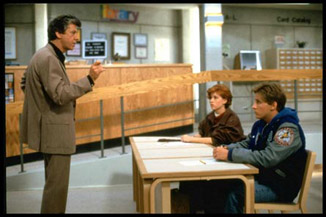Viking Night: The Breakfast Club
By Bruce Hall
August 30, 2011
Blasphemous thought of the day: The Breakfast Club is overrated. Yes, I just said that. And yes, I fully expect my life to be ruined because of it. That’s because for a lot of people, those are gonna be fighting words. John Hughes is best known as the brains behind some of the most popular coming of age/mopey-entitled-rich-kid-comedy/dramas back in the 1980s. Most of them I enjoy, despite the minimal illumination they actually provide on teen life. That is, unless you believe Sixteen Candles, which proved that despite living in a 5,000 square foot house with an attic full of money and a closet full of designer clothes, a spoiled little girl can never run out of things to whine about. Or Pretty in Pink, which taught us that the same girl would be just as miserable if you knocked her down a tax bracket and gave her a doting father, a kick ass job and two cute boys fighting over her.
There’s Always Something to Complain About - it’s the motto of being a teenager, as well as the fundamental building blocks of a John Hughes teen drama.
When you’re 17, everything sucks, everyone is stupid, nobody can tell you anything you don’t already know, nobody understands you (because nobody else has ever been 17) and you’re probably bulletproof, too. Adults will tell you that your feelings are not unique, because it’s the same torture everyone else has to go through. Families come to loggerheads because kids think they’re smarter than they are and the parents, despite having been teenagers before, seem to have forgotten what it’s like. That’s some pretty fertile dramatic ground but for the longest time, teen oriented movies were like shop class safety films. Or trivial romps like Beach Blanket Bingo and Corvette Summer. So while The Breakfast Club is not the first film that tried to portray teenagers realistically, it was one of the few up to that time that even tried. The problem is that like the children it so lovingly idolizes, The Breakfast Club excels at calling out problems yet falls well short of realistic solutions.
It starts from the get go with a quote from the David Bowie song “Changes”. That’s right; immediately the film seeks to portray children as some kind of oppressed cultural minority. In the background, a defiant young voice reads from a rambling student manifesto as Simple Minds bang away on their iconic theme song. It’s like a set of marching orders being handed down to a theater full of obedient drones and brother, my peers and I ate it up. Unfortunately it’s hard to win a battle when the fight is never really defined, and general anxiety is not something you can fight your way through in 97 minutes. But we’re sure gonna try, so let’s meet our combatants.
The place is Shermer High school in Shermer, Illinois. The time is Saturday, March 24, 1984, 0700 hours. The bout will be detention style, one round, single fall, eight hours long. In this corner is our reigning champion. Standing at six feet tall and weighing in at 187 pounds, he is the Principal of Pain. He is the Sultan of Shermer. From parts unknown I give you the one, the only - Principal Richard Vernon (Paul Gleason). I had a nemesis like him when I was a kid. He was a bully; an emotionally battered husk in a cheap polyester suit who got off on acting superior to a building full of children. In that sense, Vernon is less a distinct character and more a composite of every judgmental, intolerant adult on the planet. Richard is a surefire garden variety Dick, and he’s not very popular with the kids. Speaking of kids, let’s meet Dick’s opponents.
Continued:
1
2
3
|
|
|
|




